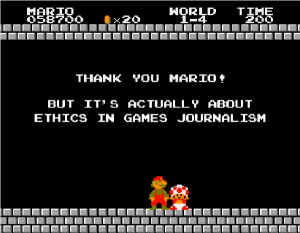In a famous study of The Great Cat Massacre, historian Robert Darnton tries to figure out why a group of apprentice printers living and working on Rue Saint-Séverin in Paris “massacred” cats in the late 1730s. Read the following quote from his writing on the subject, but think about #gamergate in the back of your mind while you do so.
anthropologists have found that the best points of entry in an attempt to penetrate an alien culture can be those where it seems to be most opaque. When you realise that you are not getting something – a joke, a proverb, a ceremony that is particularly meaningful to the natives, you can see where to grasp a foreign system of meaning in order to unravel it. By getting the joke of the great cat massacre, it may be possible to ‘get’ a basic ingredient of artisanal culture under the Old Regime.
On its face, so little of #gamergate makes any sense. As a result, I think it has a good chance of being of considerable interest to historians down the road. When historians turn to write the history of contemporary American culture #gamergate will provide a similarly opaque point of entry.

They can ask something like “How could a spurned boyfriend of a game developer’s blog posts result in a crusade ostensibly about ethics in games journalism that in practice involves an extensive campaign of death threats and harassment of women. And further, how could that become a running major news story?” I think it may be similarly possible to ‘get’ some of the basic ingredients of American culture around technology in the early 21st century by unpacking the logic and the contradictions at play in #gamergate. To that end, I think there is a clear need for collecting and preserving the records of this exchange.
The need for #GamerGate special collections
I’m not going to get into recapping the details of #GamerGate here. To that end, I can point to some exploration;
- how it represents the future of how culture wars will be fought,
- how it connects to broader patterns in online harassment
- how it is framed at the level of general news coverage
- how it continues as additional people become targets
- how it became entangled with death threats and guns in Utah
- what it has to do with the awkward birthday party for website at a strip club in New York.
Those links all go out to ongoing discussion and exploration of this, but more particularly relevant to the things I write about here, all of these links are part of the record of how this event has unfolded and I think they are going to be invaluable to those in the future that want to make sense of this well into the future.

Given the context of Darnton’s exploration of the Cat Massacre, the fact that #GamerGate is already so confounding, and that at every turn it becomes stranger and more bizarre I think it clearly has that quality of opaqueness that makes it ripe for unraveling a zeitgeist.
To that end, I think it is critical that folks in the world of special collections consider archiving some of this stuff. Here is an initial list for anyone interested in running with this.
- The chatlogs which have already become a source of considerable analysis
- The various memes that are being created as part of the exchange
- Documentation of the terms and phrases on sites like Know Your Meme, for example, “Actually it’s about ethics in games journalism” “Gamer Gate” the fictional character “Vivian James” “Nods respectfully towards you” and “Quinnspiricy”
- The Gamer Gate wikipedia page, how that page has developed over time and discussion on its talk page
- The sites and pages linked to from those Know Your Meme pages and the Wikipedia page. The Know Your Meme pages link out to a lot of the primary source material and the Wikipedia page links out to a good swath of the secondary sources.
- Discussion of the gamer gate across news articles and major blogs
- Whatever folks can hoover up from the twitter hashtag (and related hashtags) as documentation of how it has played out over that medium
What this means for collecting?

If we take seriously Darnton’s notion that many of the most important points of entry to understanding the past are those that are particularly opaque we open up an interesting challenge for collecting and preserving the now digital records of those points. Since we can’t guess future research interests, it is great that different organizations can set up programs to harvest and preserve vast chunks of the web, but I think there is considerable potential value for notions of “rapid response collecting” to emerge around particular topical areas like this as well.
If you haven’t already, go back and start to read through those Know Your Meme links in the last section. I for one, continue to be impressed by the extensive and detailed articles there. It remains a curious component of digital culture that it comes with and proliferates such a documentary perspective on itself. To that end, I’m glad that a lot of this kind of stuff will get hoovered up in a broader digital culture web archive. Still, I think another bent to this is that a project that focused on archiving the links that come of Know Your Meme pages writ large would likely be a really great idea as a way to cover the waterfront on this sort of thing in the future. Again, where links in Wikipedia are great mostly as links out to secondary sources, Know Your Meme ends up with a sizable set of links out to the the kinds of primary sources on these kinds of digital culture topics.
Thinking about the documentation and sources necessary to make sense of #GamerGate, I would be curious to hear from historians, curators, archivists and librarians about what you think we might learn about collecting from how this is playing out. I am, however, not interested in trolls and sock puppets that might want to argue about #GamerGate itself and as forewarning I moderate comments and won’t publish any that aren’t narrowly focused on the collecting/documenting piece of this.

1 Comment